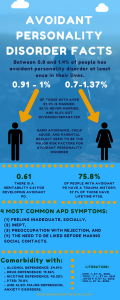Avoidant personality disorder test.
This avoidant personality disorder test can be used to see whether or not you may meet the criteria for avoidant personality disorder (avoidant PD or AVPD). It’s possible that you think you have avoidant PD, but in reality, you have social phobia. In other cases, people deny having avoidant PD, but suffer a lot from the avoidant PD symptoms. This avoidant personality disorder test can help you identify the symptoms you suffer from and can give you an indication about a possible avoidant PD.
If left untreated, AVPD symptoms get worse over time, because people with avoidant PD tend to isolate themselves more and more. Even contacting a professional becomes more difficult over time. So, use this avoidant personality disorder test wisely and reach out to a professional for help if these test results recommend you so.
This test won’t take more than 3 minutes of your time and shows immediate results with a recommendation.
Scroll down to take the quiz immediately.
People can develop AVPD due to family genetics (it can run in the family) or the way someone has been raised. Chances of developing avoidant PD increase significantly when someone experienced emotional/physical/sexual abuse as a child/adolescent. Also being bullied in school can cause avoidant PD symptoms to develop. Fortunately, avoidant PD can be treated effectively and online.
Jump to:
- How to cope with AVPD?
- Living with someone who has AVPD. (coming soon)
- Interesting avoidant PD facts.
- Online counseling for avoidant PD.
- Take me to the homepage.
At Barends Psychology Practice, we offer (online) therapy for avoidant personality disorder. Contact us to schedule a first, free of charge, online session. (Depending on your health insurance, treatment may be reimbursed).
(Advertisement. For the TEST, please scroll down.)
(Advertisement. For the TEST, please scroll down.)


